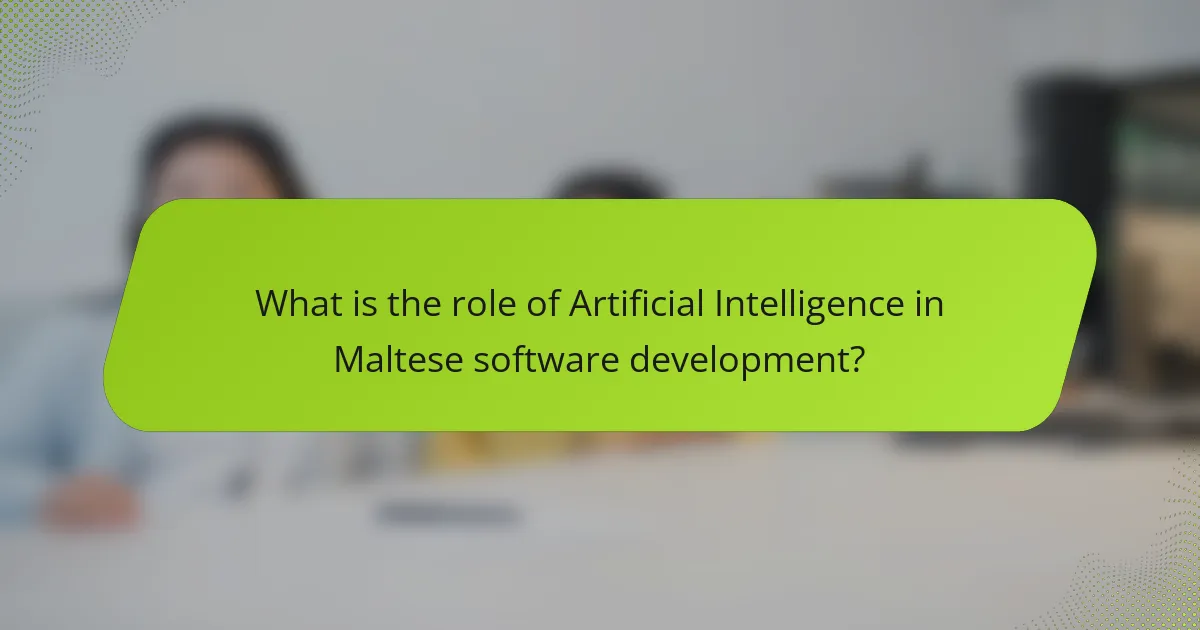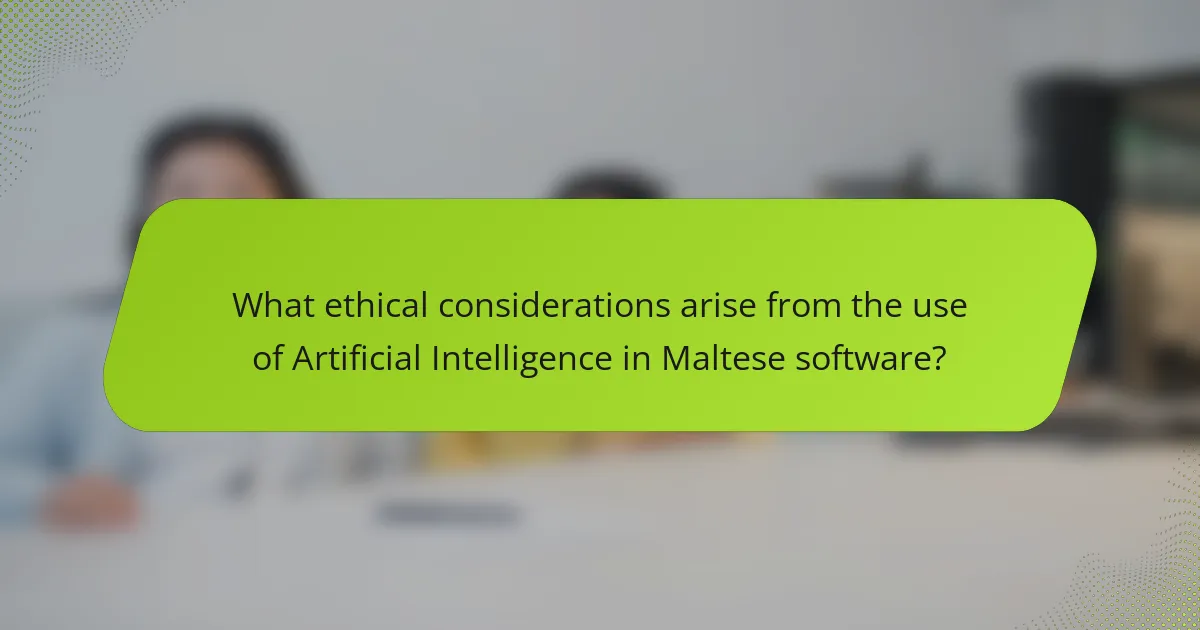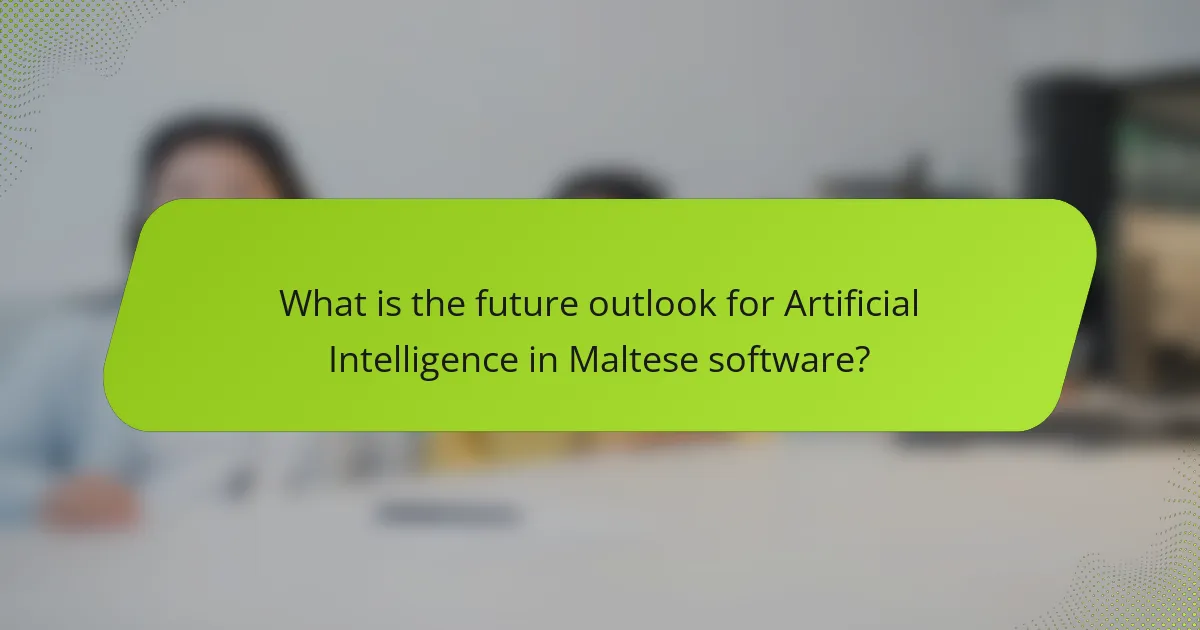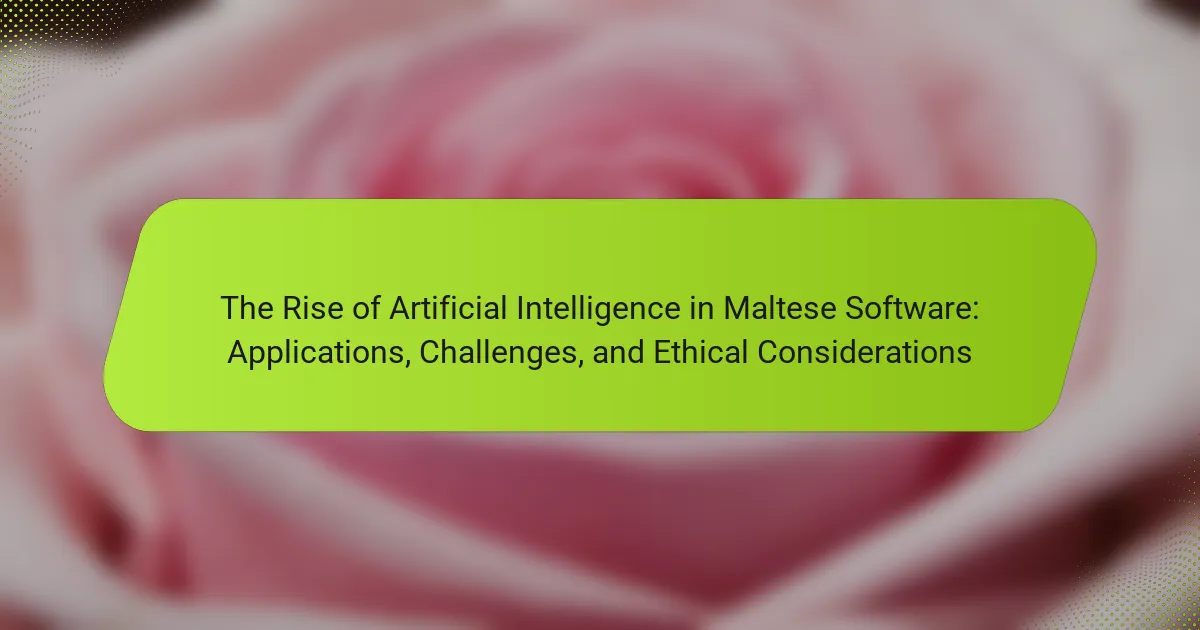
What is the role of Artificial Intelligence in Maltese software development?
Artificial Intelligence plays a significant role in Maltese software development by enhancing efficiency and innovation. AI technologies automate repetitive tasks, allowing developers to focus on complex problem-solving. Machine learning algorithms analyze large datasets, improving software performance and user experience. Natural language processing enables better interaction between users and applications. AI-driven tools assist in software testing and debugging, reducing development time. In Malta, the growing tech ecosystem fosters AI integration into various sectors, including finance and healthcare. The Maltese government supports AI initiatives, promoting research and collaboration in the field. Thus, AI is transforming Maltese software development, driving advancements and competitiveness.
How has Artificial Intelligence evolved in Malta’s software industry?
Artificial Intelligence has significantly evolved in Malta’s software industry over the past decade. The Maltese government has actively promoted AI through national strategies and funding initiatives. This has led to an increase in AI startups and innovation hubs in the region. Notable advancements include the development of AI applications in sectors such as finance, gaming, and healthcare. The establishment of the Malta AI Taskforce in 2019 has further accelerated growth by providing guidelines and fostering collaboration. Additionally, educational institutions have enhanced AI-related curricula to build a skilled workforce. According to the Malta Chamber of Commerce, the AI sector is projected to contribute substantially to the economy by 2025.
What historical factors contributed to the rise of AI in Malta?
The rise of AI in Malta is influenced by several historical factors. Malta’s strategic location in the Mediterranean facilitated trade and technology exchange. The government has actively promoted technology and innovation since the early 2000s. Initiatives such as the Malta Digital Innovation Authority were established to support tech development. The country also invested in education and training programs in computer science and engineering. Collaboration with international tech firms has brought expertise and investment to the local market. Malta’s regulatory framework has been adaptive, fostering a conducive environment for AI startups. These factors collectively contributed to the growth and adoption of AI technologies in Malta.
What technological advancements have facilitated AI growth in Maltese software?
Cloud computing has significantly facilitated AI growth in Maltese software. It provides scalable resources for data processing and storage. This enables developers to build and deploy AI applications efficiently. Machine learning frameworks, such as TensorFlow and PyTorch, have become more accessible. These frameworks allow for rapid development and experimentation. Additionally, advancements in natural language processing have improved AI’s ability to understand and generate human language. The availability of large datasets has also contributed to training more effective AI models. Furthermore, increased internet connectivity supports real-time data analysis and AI deployment. These technological advancements collectively enhance the capabilities and applications of AI in Maltese software.
What are the primary applications of Artificial Intelligence in Maltese software?
The primary applications of Artificial Intelligence in Maltese software include natural language processing, predictive analytics, and automation. Natural language processing is used for language translation and chatbots. Predictive analytics helps businesses forecast trends and make data-driven decisions. Automation streamlines tasks in various sectors such as finance and healthcare. These applications enhance efficiency and improve user experiences. The integration of AI in Maltese software is growing, reflecting global trends in technology adoption.
How is AI being utilized in healthcare software solutions in Malta?
AI is utilized in healthcare software solutions in Malta to enhance patient care and streamline operations. Machine learning algorithms analyze patient data for predictive analytics. This helps in early diagnosis and personalized treatment plans. Natural language processing assists in managing electronic health records. AI chatbots provide immediate support and information to patients. Additionally, AI aids in medical imaging analysis, improving accuracy and speed. Malta’s healthcare sector is increasingly adopting these technologies for efficiency and better outcomes. Studies show that AI integration leads to significant improvements in patient satisfaction and resource management.
What impact does AI have on financial technology in Malta?
AI significantly enhances financial technology in Malta. It improves efficiency in processing transactions and managing data. AI algorithms analyze large datasets quickly, leading to better decision-making. Financial institutions in Malta leverage AI for risk assessment and fraud detection. This technology also personalizes customer experiences through tailored financial products. Regulatory bodies in Malta are adapting to these advancements, ensuring compliance and security. The growth of AI-driven fintech is fostering innovation in the Maltese economy. Malta’s strategic position in the EU further attracts investment in AI and fintech sectors.
In what ways is AI transforming education software in Maltese institutions?
AI is transforming education software in Maltese institutions through personalized learning experiences. It enables adaptive learning platforms that adjust content based on individual student performance. AI algorithms analyze student data to identify strengths and weaknesses. This data-driven approach facilitates targeted interventions and support. Additionally, AI enhances administrative efficiency by automating grading and administrative tasks. It allows educators to focus more on teaching rather than paperwork. AI also supports virtual learning environments, making education more accessible. These advancements are supported by increasing investment in technology in Maltese education.
What challenges does the integration of Artificial Intelligence pose in Maltese software development?
The integration of Artificial Intelligence in Maltese software development poses several challenges. These include a lack of skilled professionals in AI technologies. The Maltese workforce is still developing expertise in this rapidly evolving field. Additionally, data privacy concerns arise due to stringent EU regulations, such as GDPR. Compliance with these regulations can complicate AI implementation. Furthermore, the high cost of AI infrastructure can be a barrier for small and medium enterprises. Limited access to quality datasets can hinder the effectiveness of AI models. Cultural resistance to adopting new technologies may also slow down integration efforts. Lastly, ethical considerations regarding AI decision-making processes are significant challenges that need to be addressed.
What technical hurdles do developers face when implementing AI solutions?
Developers face several technical hurdles when implementing AI solutions. Data quality is a significant challenge. Poor quality data can lead to inaccurate models. Scalability issues arise as systems must handle large datasets efficiently. Integration with existing systems can be complex and time-consuming. Resource constraints, including limited computational power, affect performance. Developers also encounter algorithmic complexity, making model development difficult. Ensuring compliance with regulations adds another layer of difficulty. Finally, the need for continuous model training and maintenance presents ongoing challenges.
How do regulatory issues affect AI deployment in Malta?
Regulatory issues significantly impact AI deployment in Malta by shaping the legal framework for technology use. These regulations ensure compliance with European Union standards, including data protection and privacy laws. The General Data Protection Regulation (GDPR) mandates strict guidelines for data handling, affecting AI systems that process personal data. Additionally, Malta’s government has introduced specific AI regulations to promote ethical use and innovation. This includes the establishment of the Malta Digital Innovation Authority, which oversees AI-related initiatives. Compliance with these regulations can slow down AI development due to the need for extensive legal assessments. However, they also foster trust and encourage responsible AI practices in the industry. Ultimately, regulatory challenges can either hinder or facilitate the growth of AI technologies in Malta.

What ethical considerations arise from the use of Artificial Intelligence in Maltese software?
Ethical considerations in the use of Artificial Intelligence in Maltese software include data privacy, algorithmic bias, and transparency. Data privacy concerns arise from the collection and processing of personal information. Maltese regulations, such as the Data Protection Act, emphasize the need for consent and secure handling of data. Algorithmic bias can lead to unfair treatment of individuals based on race, gender, or socioeconomic status. Studies indicate that biased algorithms can perpetuate existing inequalities. Transparency is crucial for accountability in AI systems. Users must understand how decisions are made by AI. The Maltese government encourages ethical AI practices through guidelines and frameworks. These considerations aim to ensure responsible development and deployment of AI technologies.
How does AI impact user privacy and data security in Malta?
AI significantly impacts user privacy and data security in Malta by enhancing data processing capabilities while posing risks to personal information. The implementation of AI technologies can lead to improved data analysis and user experience. However, these advancements may also result in unauthorized access to sensitive data. According to the General Data Protection Regulation (GDPR), which Malta adheres to, organizations must ensure data protection measures are in place. AI systems can inadvertently facilitate data breaches if not properly secured. Furthermore, the use of AI in surveillance raises ethical concerns regarding consent and data usage. Studies indicate that as AI adoption grows, so do the challenges in maintaining user privacy and data security.
What measures are being taken to protect user data in AI applications?
AI applications are implementing several measures to protect user data. These measures include data encryption, which secures information during transmission and storage. Access controls are enforced to limit data access to authorized personnel only. Anonymization techniques are applied to remove personally identifiable information from datasets. Regular audits and compliance checks are conducted to ensure adherence to data protection regulations. Organizations are also adopting privacy-by-design principles, integrating data protection into the development process from the start. Additionally, user consent is prioritized, requiring clear agreements before data collection. These practices are aligned with GDPR regulations, ensuring user rights are respected.
How do ethical concerns shape public perception of AI in Malta?
Ethical concerns significantly influence public perception of AI in Malta. Issues such as data privacy, algorithmic bias, and job displacement are at the forefront. Public awareness of these concerns has increased due to media coverage and academic discussions. For instance, a 2021 survey indicated that 70% of Maltese citizens are worried about data misuse by AI systems. Additionally, transparency in AI decision-making processes is a major concern. Citizens demand accountability and ethical guidelines to govern AI use. This has led to calls for regulatory frameworks to ensure responsible AI development. Overall, ethical considerations are shaping a cautious yet engaged public view on AI technologies in Malta.
What frameworks exist for addressing ethical AI use in Maltese software?
The frameworks for addressing ethical AI use in Maltese software include the Maltese National Strategy on Artificial Intelligence and the European Union’s AI Act. The Maltese National Strategy outlines ethical guidelines and principles for AI development and deployment. It emphasizes transparency, accountability, and human-centric design. The European Union’s AI Act aims to regulate AI technologies across member states, including Malta. It categorizes AI applications based on risk levels and establishes compliance requirements. These frameworks ensure that AI systems are developed responsibly, aligning with ethical standards and societal values.
What guidelines are proposed for responsible AI development in Malta?
Malta proposes several guidelines for responsible AI development. These guidelines emphasize ethical considerations and transparency. They encourage stakeholder engagement and collaboration. Data protection and privacy are also prioritized. The guidelines promote fairness and non-discrimination in AI systems. They advocate for accountability in AI decision-making processes. Continuous monitoring and evaluation of AI impacts are recommended. These principles aim to foster trust in AI technologies within Malta.
How can Maltese software companies ensure ethical compliance in AI applications?
Maltese software companies can ensure ethical compliance in AI applications by implementing robust ethical guidelines. These guidelines should align with international standards, such as the EU’s AI Act. Regular training on ethical AI practices for employees is essential. Companies should also conduct impact assessments to evaluate potential biases in AI systems. Transparency in AI algorithms fosters trust and accountability. Engaging with stakeholders, including users and affected communities, enhances ethical considerations. Additionally, establishing an ethics review board can help oversee AI projects. Continuous monitoring of AI applications ensures adherence to ethical standards.

What is the future outlook for Artificial Intelligence in Maltese software?
The future outlook for Artificial Intelligence in Maltese software is promising. Increased investment in technology is driving innovation. The Maltese government supports AI initiatives through funding and policy frameworks. Local universities are enhancing AI education and research programs. Collaboration between tech companies and academic institutions is fostering development. Businesses are adopting AI for efficiency and competitive advantage. The growing demand for AI solutions is evident in various sectors, including finance and healthcare. Malta’s strategic location and EU membership provide access to broader markets.
How can Maltese software developers prepare for future AI advancements?
Maltese software developers can prepare for future AI advancements by enhancing their skills in machine learning and data analysis. They should engage in continuous education through online courses and workshops focused on AI technologies. Collaboration with AI research institutions can provide practical insights into emerging trends. Developers must also familiarize themselves with AI ethics and regulations to ensure responsible use of technology. Networking with industry professionals can facilitate knowledge sharing and best practices. Participating in AI-focused hackathons can foster innovative thinking and problem-solving skills. Staying updated on AI literature and case studies will help developers understand real-world applications. Adopting agile methodologies can improve their adaptability to rapid changes in AI technologies.
What skills will be essential for developers in an AI-driven landscape?
Developers in an AI-driven landscape will need strong programming skills, particularly in languages like Python and R. These languages are widely used for AI and machine learning applications. Understanding algorithms and data structures is crucial for optimizing performance. Knowledge of machine learning frameworks, such as TensorFlow and PyTorch, is essential for building AI models. Familiarity with data manipulation and analysis tools, like Pandas and NumPy, is also important. Developers must also possess skills in cloud computing platforms, such as AWS or Google Cloud, for deploying AI solutions. Additionally, strong problem-solving abilities and critical thinking are necessary to tackle complex challenges in AI development. Keeping updated with AI trends and ethical considerations is vital for responsible development.
How can collaboration between academia and industry enhance AI innovation in Malta?
Collaboration between academia and industry can significantly enhance AI innovation in Malta. This partnership fosters knowledge exchange and accelerates research applications. Academia provides cutting-edge research and theoretical frameworks. Industry offers practical insights and real-world challenges. Joint projects can lead to the development of innovative AI solutions tailored to local needs. For instance, the University of Malta has partnered with tech companies to advance AI research. These collaborations often result in internships, which prepare students for industry demands. Furthermore, shared resources and funding can drive more ambitious AI projects.
What best practices should be followed for successful AI integration in Maltese software?
Successful AI integration in Maltese software requires clear objectives and stakeholder involvement. Define specific goals for AI applications to ensure alignment with business needs. Engage stakeholders early in the process to gather insights and foster support. Invest in training for staff to enhance AI literacy and skill sets. Implement robust data management practices to ensure high-quality input for AI systems. Regularly evaluate and update AI models to maintain accuracy and relevance. Foster a culture of innovation to encourage experimentation and adaptation. Ensure compliance with local regulations and ethical standards to build trust and accountability.
How can companies effectively assess the impact of AI on their software solutions?
Companies can effectively assess the impact of AI on their software solutions by implementing a structured evaluation framework. This framework should include performance metrics, user feedback, and comparative analysis against non-AI solutions. Performance metrics can quantify improvements in efficiency, accuracy, and speed. User feedback provides insights into usability and satisfaction. Comparative analysis helps identify the specific advantages AI brings over traditional methods. According to a study by McKinsey & Company, companies that systematically evaluate AI impacts report a 20% increase in productivity. This systematic approach ensures that companies can make informed decisions about AI integration.
What strategies can be implemented to foster a culture of ethical AI development?
Implementing strategies to foster a culture of ethical AI development involves several key actions. First, organizations should establish clear ethical guidelines for AI usage. These guidelines should address issues like fairness, transparency, and accountability. Second, promoting interdisciplinary collaboration is essential. Engaging ethicists, social scientists, and technologists can provide diverse perspectives on ethical implications. Third, organizations must prioritize training and education on ethical AI practices. Continuous learning ensures that all team members understand the ethical dimensions of their work. Fourth, implementing regular audits and assessments of AI systems can help identify and mitigate ethical risks. Research indicates that organizations with robust ethical frameworks outperform those without in user trust and acceptance. Lastly, fostering an open dialogue about ethical concerns encourages a proactive approach to addressing potential issues. These strategies collectively create an environment that prioritizes ethical considerations in AI development.
The main entity of the article is Artificial Intelligence (AI) in Maltese software development. The article provides a comprehensive overview of the role of AI in enhancing efficiency and innovation within the Maltese tech ecosystem, highlighting its applications in sectors such as finance, healthcare, and education. It discusses the evolution of AI in Malta, historical factors contributing to its rise, technological advancements facilitating growth, and the primary applications of AI technologies. Additionally, the article addresses challenges related to AI integration, including data privacy, ethical considerations, and regulatory issues, while outlining best practices for successful AI implementation and the future outlook for AI in Maltese software.
